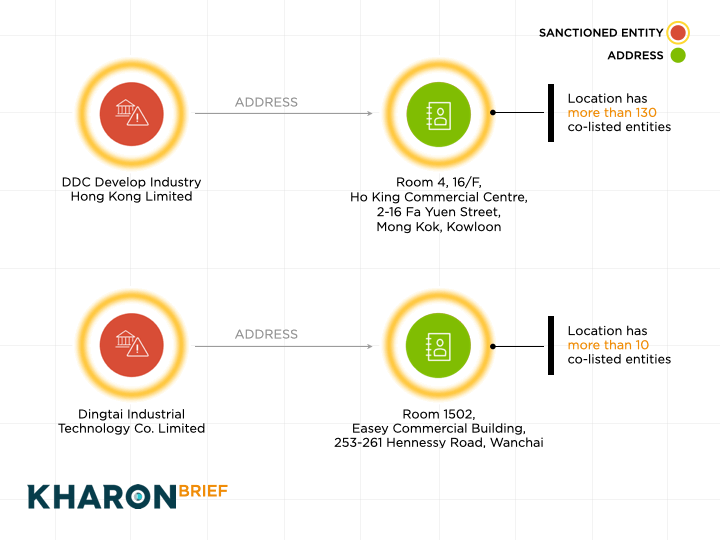The U.S. Treasury Department sanctioned six entities based in China and Hong Kong last week for facilitating Iran’s procurement of drone components, as the Trump administration ramps up its “maximum pressure” campaign.
Wednesday’s action targeted front companies of the U.S.-designated Iranian company Pishtazan Kavosh Gostar Boshra (PKGB) and its subsidiary Narin Sepehr Mobin Isatis (NSMI), which Treasury called “key suppliers” for Iran’s unmanned aerial vehicle (UAV) and ballistic missile programs.
“Iran continues to try to find new ways to procure the key components it needs to bolster its UAV weapons program through new front companies and third-country suppliers,” Treasury Secretary Scott Bessent said in a statement.
What the announcement didn’t say: Two of the sanctioned entities operated from addresses previously added to the U.S. Bureau of Industry and Security’s (BIS) Entity List, because of their high risk of diversion to Russia.
One of those BIS-listed addresses, a single room that the Treasury lists as the address for the newly sanctioned DDC Develop Industry Hong Kong Limited, has more than 130 entities co-listed there, according to Kharon’s research.
Wednesday’s action targeted front companies of the U.S.-designated Iranian company Pishtazan Kavosh Gostar Boshra (PKGB) and its subsidiary Narin Sepehr Mobin Isatis (NSMI), which Treasury called “key suppliers” for Iran’s unmanned aerial vehicle (UAV) and ballistic missile programs.
“Iran continues to try to find new ways to procure the key components it needs to bolster its UAV weapons program through new front companies and third-country suppliers,” Treasury Secretary Scott Bessent said in a statement.
What the announcement didn’t say: Two of the sanctioned entities operated from addresses previously added to the U.S. Bureau of Industry and Security’s (BIS) Entity List, because of their high risk of diversion to Russia.
One of those BIS-listed addresses, a single room that the Treasury lists as the address for the newly sanctioned DDC Develop Industry Hong Kong Limited, has more than 130 entities co-listed there, according to Kharon’s research.

Kharon users can explore this Insight in greater detail through the ClearView platform.
But both of the two sanctioned entities — DDC Develop and Dingtai Industrial — have since registered at new Hong Kong addresses, not listed by the Treasury, that are linked to front companies sanctioned last February for procuring for PKGB, according to corporate disclosures reviewed by Kharon.
For context: BIS amended the Export Administration Regulations last June to allow the inclusion of specific addresses on the Entity List without corresponding entity names. That critical change aimed to combat diversion by targeting locations frequently used by front companies, shell entities or reshipment points to evade export controls.
“This will make it harder for shell companies, who can easily change their names or use multiple corporate identities, to find a corporate services provider willing to lend the use of their address for unlawful trade,” BIS said in its announcement of the change. The new rule, it said, requires enhanced client screening.
So far, 16 addresses in Hong Kong, China, and Türkiye have been added to the Entity List under this new framework. These locations have facilitated trade for more than 1,400 entities, some of which have been sanctioned by the U.S., EU, and U.K. for their roles in supporting Russia’s military end users and military-industrial base.
Key takeaways: The Entity List’s expansion and these latest U.S. designations highlight the increasing focus on geographic risk exposure in global supply chains and countering weapons proliferation. They also highlight the importance of addressing potential compliance vulnerabilities not only with high-risk actors involved in evasion but also in high-risk transshipment points.
Read more:
For context: BIS amended the Export Administration Regulations last June to allow the inclusion of specific addresses on the Entity List without corresponding entity names. That critical change aimed to combat diversion by targeting locations frequently used by front companies, shell entities or reshipment points to evade export controls.
“This will make it harder for shell companies, who can easily change their names or use multiple corporate identities, to find a corporate services provider willing to lend the use of their address for unlawful trade,” BIS said in its announcement of the change. The new rule, it said, requires enhanced client screening.
So far, 16 addresses in Hong Kong, China, and Türkiye have been added to the Entity List under this new framework. These locations have facilitated trade for more than 1,400 entities, some of which have been sanctioned by the U.S., EU, and U.K. for their roles in supporting Russia’s military end users and military-industrial base.
Key takeaways: The Entity List’s expansion and these latest U.S. designations highlight the increasing focus on geographic risk exposure in global supply chains and countering weapons proliferation. They also highlight the importance of addressing potential compliance vulnerabilities not only with high-risk actors involved in evasion but also in high-risk transshipment points.
Read more:







